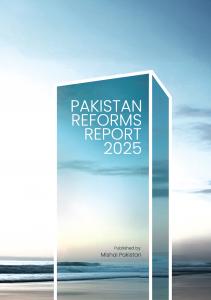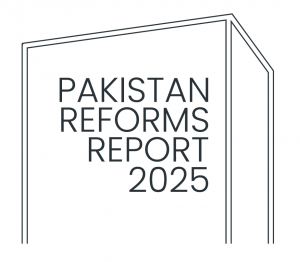
Pakistan Reforms Report 2025 Launched
Pakistan's First-Ever Governance Reforms Report Released: In-Depth Analysis of 120+ Reforms Implemented in 11 Months
For the first time in Pakistan, a comprehensive effort has been made to systematically document the government’s reform agenda. Over the past 11 months, more than 120+ reforms have been implemented across multiple sectors, shaping the country’s governance, economic policies, legal frameworks, and institutional efficiencies. This initiative is crucial in providing an accurate and transparent account of policy transformations, allowing stakeholders—including policymakers, businesses, and international institutions—to engage with and evaluate Pakistan’s evolving governance landscape.
By bridging the information gap, the Pakistan Reforms Report 2025 ensures that reforms are acknowledged, analysed, and serve as a foundation for future governance advancements.
Unlike most international reports that capture data only from January to May every year, the Pakistan Reforms Report 2025 offers a full-year assessment, presenting a more accurate and holistic picture of governance, accountability, and inclusivity reforms.
Speaking at the launch of the Pakistan Reforms Report 2025, Amir Jahangir, Chief Executive Officer of Mishal Pakistan, the Country Partner Institute of the World Economic Forum, highlighted the significance of the report and said, “The Pakistan Reforms Report 2025 is an unprecedented initiative aimed at bridging the knowledge gap in governance reforms. While international assessments often focus on fragmented data, this report presents a full-spectrum analysis of how Pakistan has transformed under the Shahbaz Sharif administration." He further said, “By documenting reforms in a structured and accessible manner, we empower policymakers, businesses, and global institutions with the knowledge needed to engage with Pakistan’s evolving governance landscape.”
The Pakistan Reforms Report 2025 is an essential resource for policymakers, investors, academics, and development organizations seeking to understand Pakistan’s evolving governance framework. Through extensive research, data collection, and stakeholder engagement, the report provides a structured, transparent, and comprehensive overview of the government’s performance in key areas.
Mishal Pakistan is an award-winning business intelligence, public policy, and strategic communications institution. As the Country Partner Institute of the World Economic Forum (WEF), Mishal Pakistan contributes to several global competitiveness indices, including the Global Competitiveness Report, Global Growth Index, Global Gender Gap Index, Global Travel and Tourism Development Report, and the Network Readiness Index. The organization has been at the forefront of media development, governance innovation, and digital transformation in Pakistan.
The complete Pakistan Reforms Report 2025 (PRR25) is available for public access and download at mishal.com.pk/reforms2025
Notes to the Editor:
Extensive Reform Agenda: The Report reviewed the Shahbaz Sharif administration’s 120+ reforms focusing on governance, economic stability, and social inclusion in 2024.
Full-Year Assessment: Unlike most international reports that only cover January to May, the Pakistan Reforms Report 2025 evaluates reforms across the entire year, i.e., January 24 to February 2025.
Holistic Analysis: The Report provides a comprehensive view of governance, accountability, and inclusivity reforms.
More Accurate Representation: Captures the full impact of policy changes, ensuring a better-informed perspective on Pakistan’s progress.
Key Challenges Addressed: The Report documents the government’s approach to economic instability, high inflation, dwindling foreign reserves, and debt pressures, along with political polarization and bureaucratic inefficiencies. The Reforms include:
Governance & Public Sector Reforms
- 150,000 federal workforce positions eliminated to reduce expenditures.
- 33% female representation mandated on government boards.
Economic & Financial Reforms
- Inflation reduced from 38% in May 2023 to 4.1% by December 2024.
- Foreign exchange reserves increased from $4.4 billion to $11.73 billion by the end of 2024.
- Helped maintain currency stability and prevent extreme fluctuations.
- GDP growth improved from 0.29% to 2.38% in the past year, projected to reach 3.5% in FY25.
- Trade deficit reduced from $27.47 billion to $17.54 billion in 12 months.
- Defined contribution pension reform expected to save Rs. 1.7 trillion over 10 years.
- Rs. 83 billion expected reduction in pension allocations for FY 2025–2026.
- Restored investor confidence; encouraging local and foreign investment.
- Averted a severe economic crisis through strategic intervention, through SIFC.
- Expanded crackdown on illicit trade through targeted illegal activities under the Afghanistan Transit Trade Agreement (ATTA).
- Addressed the influx of untaxed, smuggled goods into Pakistan.
Investment & Industrial Reforms
- 34 Memorandums of Understanding (MoUs) signed with Saudi Arabia, worth $2.8 billion.
- SEZ expansion and industrial policy reforms expected to boost exports and attract FDI.
- Business Facilitation Centers (BFCs) to ease regulatory burdens.
Security & Immigration Reforms
- Visa Prior to Arrival (VPA) facility granted to 120 countries; over 120,000 visas approved in 6 months.
- All madrassas must register within six months (new ones within a year).
- Madrassas are required to submit financial audits annually to ensure transparency.
- Encourages the inclusion of modern education subjects alongside religious studies in madrassas.
- Madrassas can register under either the Societies Act or the Ministry of Education.
- Creation of the National Forensics and Cybercrime Agency (NFCA) to tackle cyber threats.
- 1,600 Special Protection Unit (SPU) personnel deployed to safeguard non-CPEC projects.
- 100 surveillance cameras installed under the Islamabad Safe City Project.
- 973 officers recruited for the new Anti-Riot Force.
Digital Transformation & Cybersecurity
- National Forensics and Cybercrime Agency (NFCA) established.
- The Digital Case Flow Management System implemented in 178 federal courts, tracking 130,000 cases via SMS.
- AI-driven National Registration & Biometric Policy Framework launched.
- Introduced new policies to protect users from data breaches and cyber threats.
- Updates outdated cyber laws to align with global best practices.
- Strengthens laws against false, misleading, and harmful digital content.
- Establishment of Social Media Protection and Regulatory Authority for digital oversight.
- Adjustments made to penalties for fake news while
Jahangir Amir
Mishal Pakistan
+92 300 8555161
email us here
Visit us on social media:
Facebook
LinkedIn
Instagram
YouTube
Distribution channels: Banking, Finance & Investment Industry, Book Publishing Industry, Business & Economy, IT Industry, World & Regional
Legal Disclaimer:
EIN Presswire provides this news content "as is" without warranty of any kind. We do not accept any responsibility or liability for the accuracy, content, images, videos, licenses, completeness, legality, or reliability of the information contained in this article. If you have any complaints or copyright issues related to this article, kindly contact the author above.
Submit your press release


